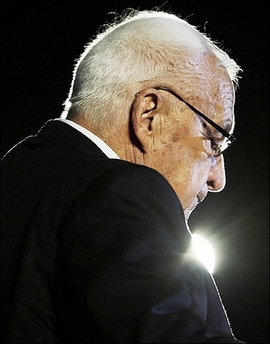The condition of former Israeli Prime Minister Ariel Sharon, who has been in
a coma since suffering a stroke in January, has deteriorated though there was no
immediate danger to his life, hospital officials and former aides said Sunday.

Israel marks six
months since prime minister Ariel Sharon, pictured in 2005, suffered a
massive stroke, his towering legacy still keenly felt as the new
government grapples with the worst Middle East crisis in
months.[AFP\File] |
Sharon, 78, was having a problem with his kidneys at Sheba Medical Center in
the Tel Aviv suburb of Tel Hashomer. Hospital officials also said brain checks
had shown changes in Sharon's brain tissue, but gave no further details.
"Over the past two days, the condition of the former prime minister has
deteriorated. His kidney function is worsening and he's amassing liquids in his
body," the hospital said in a statement.
Two of Sharon's former aides, who said they spoke to his son Gilad, said
there was no immediate danger to the former leader's life. The former aides
spoke on condition of anonymity because they were not authorized to speak to the
press.
Hospital officials confirmed by phone that Sharon's kidney function was
worsening, that his body was accumulating liquids and that his brain tissue had
undergone changes. They said doctors were conducting additional checks to
determine what caused the change in his condition and how to treat him.
Israel's Army Radio cited medical experts as saying this type of
deterioration is not uncommon for people who have been in a coma for such a long
time.
Sharon, Israel's most popular politician, had a small stroke in December and
was put on blood thinners before he suffered a severe brain hemorrhage in
January. The Israeli leader underwent several, extensive brain surgeries to stop
the bleeding, and many independent experts doubted that he would ever recover.
The last surgery on Sharon, in April, was to reattach a part of his skull,
removed during the emergency surgery to reduce pressure on his brain. The
reattachment was described as a necessary step before transferring Sharon to a
long-term care facility.
Experts have said Sharon's chances of ever waking up after his massive stroke
in January are not good.
Sharon personified Israel's military might for decades, and Israelis were
stunned to see him felled by illness.
His stroke came after Sharon saw through his contentious plan to withdrawal
Israel from the Gaza Strip after 38 years, and just two months after he shook up
the Israeli political map by bolting his hard-line Likud Party to form the
centrist Kadima faction.
Sharon's successor as party leader, Prime Minister Ehud Olmert, led Kadima to
a slim victory in the March 28 election.